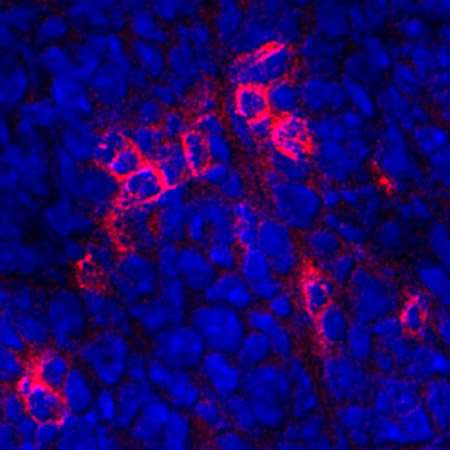Drug combination may improve impact of immunotherapy in head and neck cancer

Checkpoint inhibitor-based immunotherapy has been shown to be very effective in recurrent and metastatic head and neck cancer but only in a minority of patients. University of California San Diego School of Medicine researchers may have found a way to double down on immunotherapy's effectiveness.
In a paper published in the journal JCI Insights on September 21, researchers report that a combination of toll-like receptors (TLR) agonists—specialized proteins that initiate immune response to foreign pathogens or, in this case, cancer cells—and other immunotherapies injected directly into a tumor suppresses tumor growth throughout the whole body.
"The mechanism reverses the phenotype of a tumor by changing its inherit properties to make the tumor more immunogenic," said Ezra E.W. Cohen, MD, professor of medicine at UC San Diego School of Medicine and associate director for translational science at UC San Diego Moores Cancer Center and senior author on the paper. "In this study, the combination of immunotherapy drugs resulted in the complete elimination of cancer cells and even when re-challenged the tumors did not recur."
Macrophages are specialized immune cells that destroy targeted cells. They are supposed to present antigens to the immune system to get it started, but in cancer they stop doing that so the immune system is unable to recognize the cancer. The combination of drugs restored the ability of macrophages to initiate a tumor response and allow the immune system to eliminate the cancer.
To improve the efficiency of checkpoint inhibitor immunotherapy on human papillomavirus-negative and HPV-positive head and neck cancers, the team of researchers combined synthetic TLR7 and TLR9 that were developed by Dennis Carson, MD, Professor Emeritus at UC San Diego School of Medicine, with an inhibitor of the protein called programmed death-1 receptor (PD-1) which is responsible for turning off T cells.
TLR agonists cause an innate immune response—that is, the rapid response to a foreign substance in the body. This immediate protection comes at a cost since the nonspecific immune response may harm healthy cells if activation of the immune systems persists. PD-1 inhibitors stimulate an adaptive response calling on B cells and T cells to respond to a specific target, but this process takes longer to go into effect.
In mouse models, the combined TLR agonists and PD-1 inhibitors injected directly into a tumor incited a tumor-specific response by T cells which prevented metastasis or the spread of the cancer. When cancer had already spread, the TLR and anti-PD-1 combo eliminated the primary tumor as well as distant tumors. The combination therapy was more effective than either agent alone.
The next step should be to study these drugs in a clinical setting for head and neck cancer using FDA-approved immunotherapy. In addition, Cohen suggests studying these agents with other combinations such as chemotherapy and radiation therapy.
"As we make the tumor more immunogenic we should be making other therapies more effective and eliminate the cancer completely," said Cohen.
More information: JCI Insights, DOI: 10.1172/jci.insight93397


















